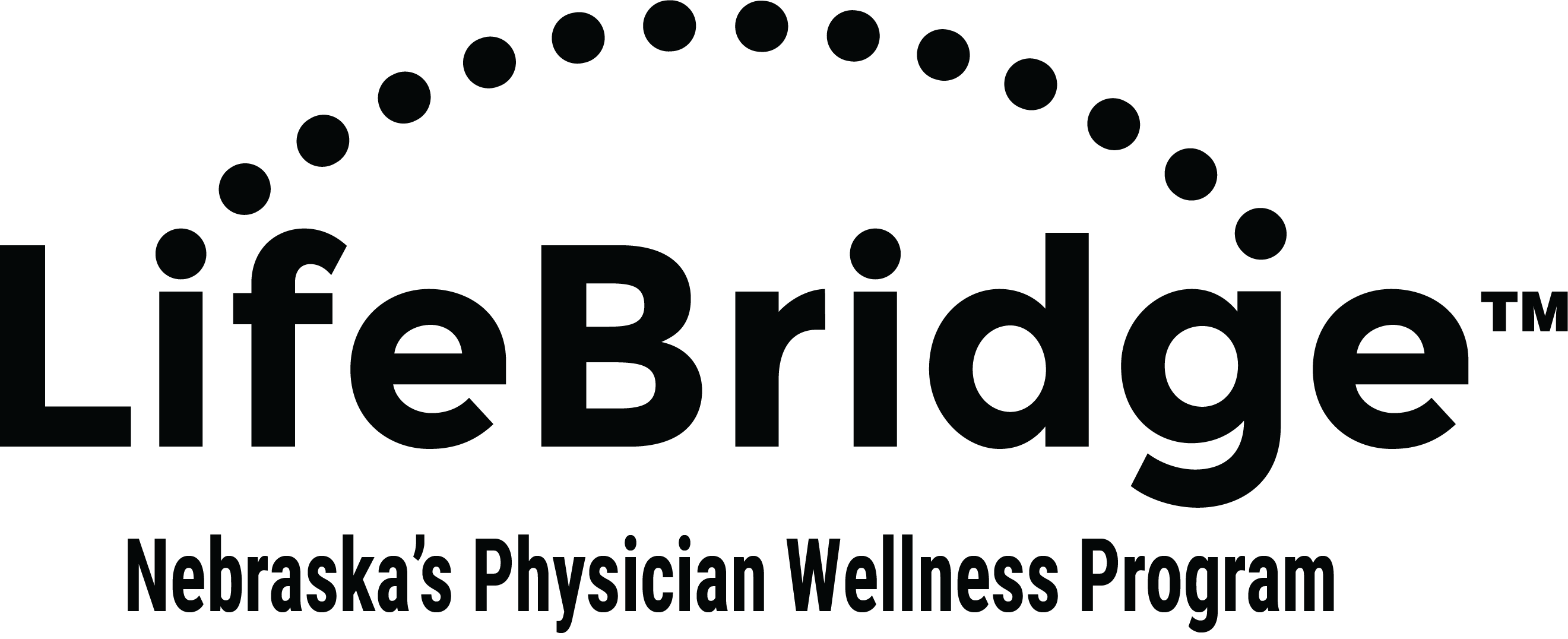The Power of Coaching: Empowering Physicians for Personal and Professional Growth
LifeBridge Nebraska was created for all Nebraska-licensed physicians and residents as a support to deal with the complex issues that physicians face every day. At LifeBridge we hear all the time…
- “I don’t know what I would need coaching for.”
- “It’s just another thing to add to my day.”
- “I thought I had to be burned out to use LifeBridge?”
Being a physician is a demanding and noble profession, requiring unwavering dedication, exceptional skills, and a deep commitment to patient care. Physicians navigate complex medical scenarios, make life-altering decisions, and shoulder immense responsibility on a daily basis. While their expertise and knowledge are vital, it’s important to recognize that physicians are not immune to the challenges, transitions, and doubts that can arise throughout their careers.
In recent years, a growing number of physicians have turned to professional coaching as a valuable resource to address a wide range of personal and professional concerns. Coaching provides a confidential and supportive space for physicians to explore their aspirations, overcome obstacles, and develop strategies for growth. It offers a unique opportunity to work collaboratively with a trained professional who understands the nuances of the medical field and can provide guidance tailored to the unique needs of physicians.
In this article, we will dive into various scenarios where physicians might seek professional coaching and the profound impact it can have on their lives. From career transitions and burnout prevention to enhancing leadership skills and addressing imposter syndrome, coaching offers a transformative path towards personal and professional growth. We will explore real-life scenarios where physicians have benefited from coaching, shedding light on the value it brings to their careers and overall well-being.
Whether you’re a physician seeking guidance or simply curious about the impact of coaching in the medical profession, this article will provide insights and inspiration to embrace the possibilities that lie ahead.
Remember, even the most skilled and dedicated physicians can benefit from the guidance, support, and fresh perspectives that coaching offers. Here are a few scenarios where a physician might consider calling in and utilizing professional coaching:
Nearing Retirement: Physicians who are nearing retirement may experience challenges related to their identity and purpose. Professional coaching can provide support in navigating this transition by helping them explore new roles, interests, and ways to find fulfillment outside of their medical career.

Career Transitions: Physicians may seek coaching when contemplating a career change or transitioning to a different medical specialty. Coaches can assist in clarifying goals, assessing skills and values, and developing a strategic plan to successfully navigate the transition.
Burnout and Work-Life Balance: Physicians experiencing burnout, high levels of stress, or struggles with work-life balance can benefit from coaching. Coaches can provide tools and strategies to manage stress, set boundaries, and prioritize self-care, ultimately helping physicians regain a sense of fulfillment and well-being in their professional and personal lives.
Effective Leadership Development: Physicians who are transitioning into or are currently in leadership roles, such as department heads, medical directors, or administrators, may seek coaching to enhance their leadership effectiveness, inspire and motivate their teams, and create a positive work culture. Coaches can assist in developing effective communication, emotional intelligence, conflict resolution, and decision-making abilities, as well as support physicians in adapting to their new responsibilities.
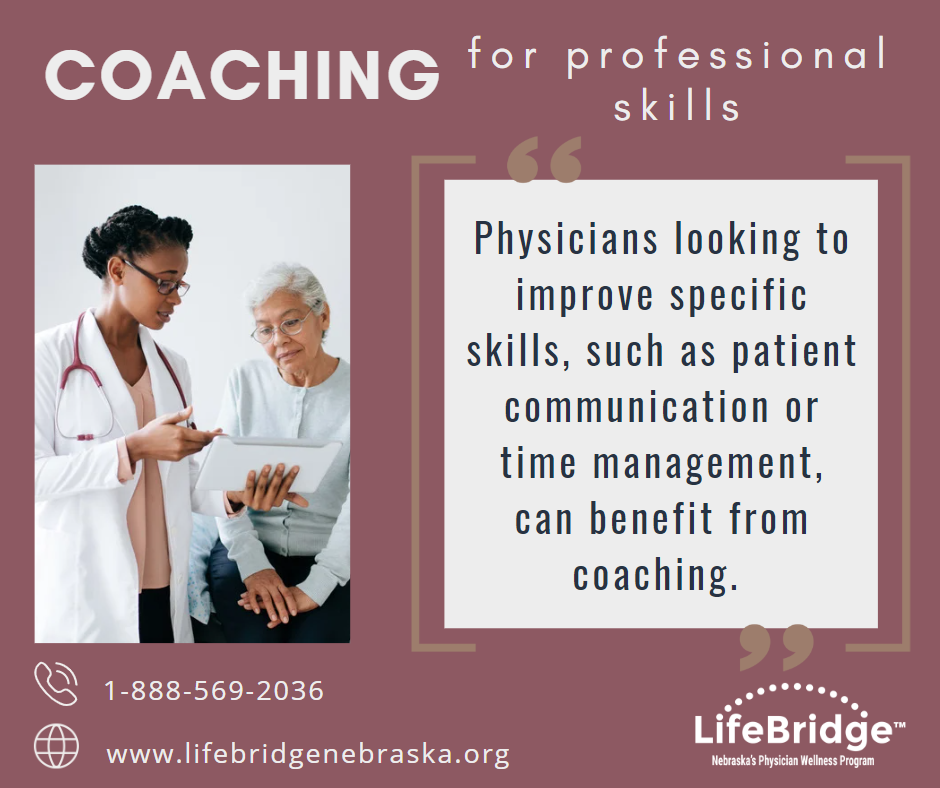
Enhancing Professional Skills: Physicians looking to improve specific skills or areas of their practice, such as patient communication, time management, or practice management, can benefit from coaching. Coaches can provide feedback, guidance, and personalized strategies to help physicians enhance their performance and achieve their professional goals.
Work-Related Challenges: Physicians facing work-related challenges, such as difficult relationships with colleagues, conflicts within the team, or navigating complex organizational dynamics, can find coaching valuable. Coaches can offer a fresh perspective, help develop effective strategies for handling difficult situations, and support physicians in finding constructive solutions.
Goal Setting and Accountability: Some physicians may feel stuck or lack clarity in their career paths or personal aspirations. Coaching can help physicians set meaningful goals, break them down into actionable steps, and provide accountability to stay on track towards achieving those goals.
Improving Interpersonal Skills: Physicians who want to enhance their communication skills, empathy, and patient-centered care may seek coaching. Coaches can provide tools and techniques to improve bedside manner, build rapport with patients, and navigate challenging conversations effectively.
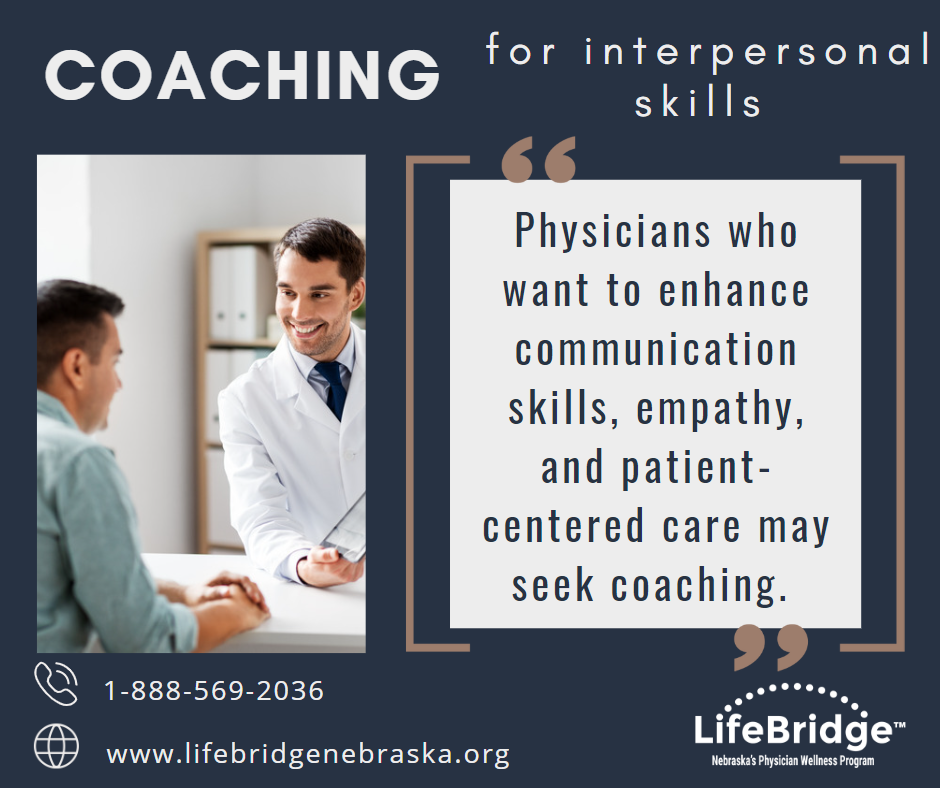
Managing Team Dynamics: Physicians in leadership positions or those working in team-based healthcare settings may encounter difficulties in managing and leading a diverse team. Coaching can help physicians develop strategies to foster collaboration, address conflicts, and create a positive and productive work environment.
Professional Development and Advancement: Physicians aiming to advance their careers, pursue academic opportunities, or gain recognition within their specialty may find coaching beneficial. Coaches can assist in developing career advancement plans, identifying networking opportunities, and providing guidance on professional growth.
Enhancing Resilience: Physicians facing high-pressure environments, dealing with medical errors, or coping with emotionally challenging patient cases may seek coaching to enhance their resilience. Coaches can offer support in developing coping strategies, self-care practices, and mindset shifts to bounce back from setbacks and maintain well-being.
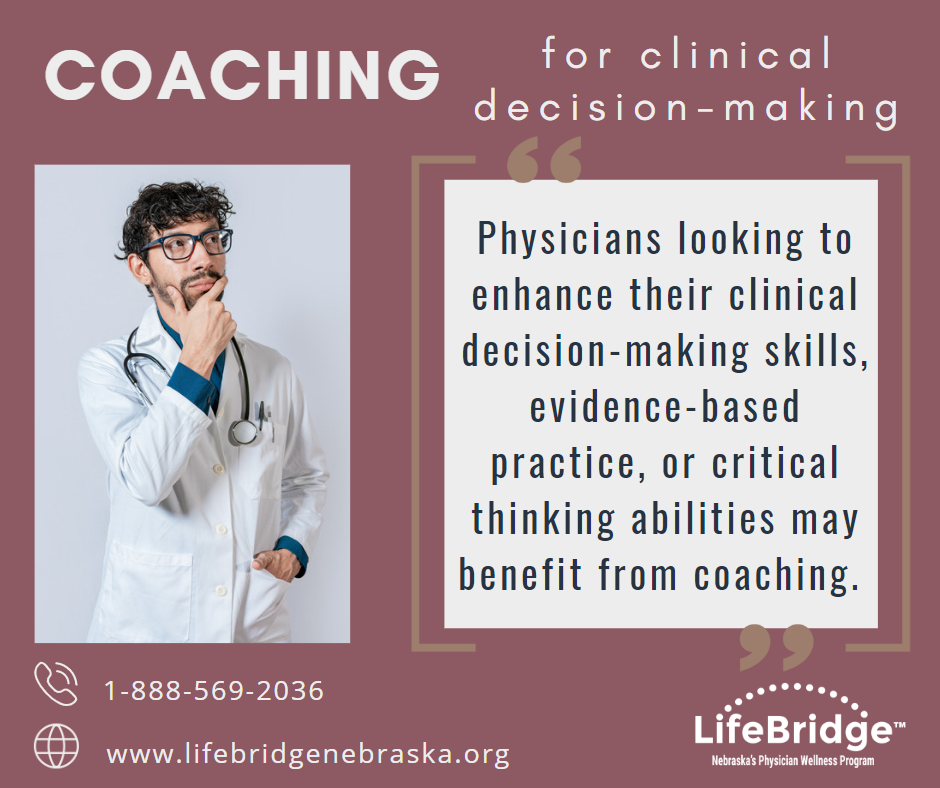
Enhancing Clinical Decision-Making: Physicians looking to enhance their clinical decision-making skills, evidence-based practice, or critical thinking abilities may benefit from coaching. Coaches can provide frameworks, resources, and mentorship to help physicians make sound and informed decisions in complex medical situations.
Transitioning to Academic Medicine: Physicians transitioning from clinical practice to academic medicine, such as joining a medical school faculty or pursuing research, may seek coaching to navigate the unique challenges of academia. Coaches can offer guidance on teaching, research skills, grant writing, and balancing clinical and academic responsibilities.
Overcoming Professional Plateaus: Physicians who feel stuck in their careers or experience a lack of motivation and fulfillment may seek coaching to overcome professional plateaus. Coaches can assist in identifying areas for growth, exploring new opportunities, and reigniting passion and purpose in their medical practice.
Balancing Career and Personal Relationships: Physicians who struggle with balancing their demanding careers with personal relationships, such as marriage or parenting, may seek coaching. Coaches can help physicians explore strategies to create harmony between work and personal life, set boundaries, and improve communication within their relationships.
Navigating Contract Negotiations: Physicians entering into contract negotiations with employers or considering partnership opportunities may benefit from coaching. Coaches can provide guidance on contract terms, negotiation techniques, and empower physicians to advocate for their professional and financial interests effectively.

Overcoming Imposter Syndrome: Physicians experiencing imposter syndrome, a persistent feeling of inadequacy and self-doubt despite evidence of competence, can find coaching helpful. Coaches can assist in recognizing and reframing limiting beliefs, building self-confidence, and developing strategies to overcome imposter syndrome in their medical practice.
Relationship Challenges with Colleagues or Superiors: Physicians who encounter challenging relationships with colleagues, superiors, or staff members may seek coaching to navigate these dynamics effectively. Coaches can offer tools for effective communication, conflict resolution, and building collaborative relationships within the workplace.
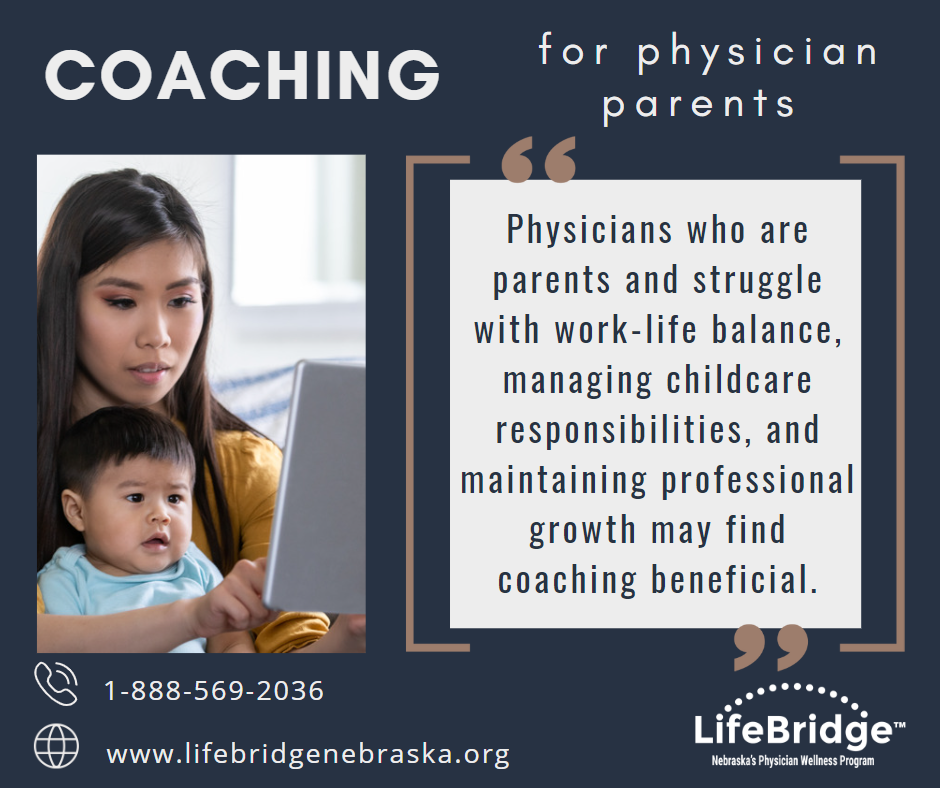
Parenting and Work-Life Integration: Physicians who are parents and struggle with work-life integration, managing childcare responsibilities, and maintaining their professional growth may find coaching beneficial. Coaches can provide support in setting priorities, time management, and exploring strategies for effective parenting while pursuing a fulfilling medical career.
Enhancing Self-Advocacy Skills: Physicians who struggle with asserting themselves, advocating for their needs, or communicating their value effectively can benefit from coaching. Coaches can help physicians develop assertiveness skills, assert their professional boundaries, and advocate for their career goals and aspirations.
Addressing Relationship Struggles: Physicians facing relationship struggles, such as difficulties with a spouse, partner, or family members, may find coaching valuable. Coaches can provide a supportive space to explore challenges, develop communication skills, and work towards healthier and more fulfilling relationships.
Managing Work Overload and Stress: Physicians dealing with work overload, high levels of stress, or feelings of overwhelm can seek coaching for support. Coaches can assist in developing effective time management strategies, stress reduction techniques, and resilience-building practices to promote overall well-being.
Remember, these scenarios are just a starting point, and coaching can be tailored to address a wide range of individual needs and aspirations within the medical profession. These scenarios highlight how coaching can be a valuable resource for physicians not only in their professional lives but also in addressing personal challenges and fostering holistic well-being.
